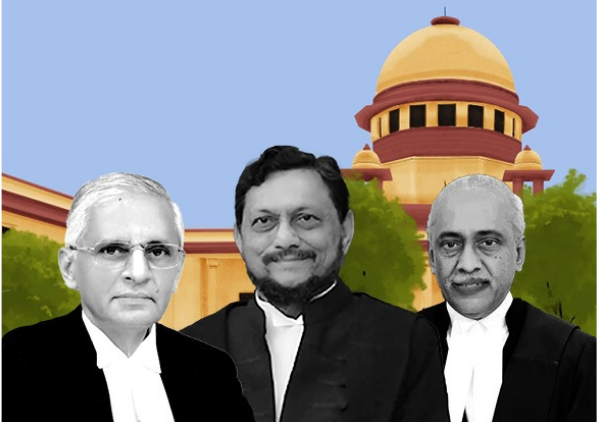Any Waiver Of Pre Deposit To Entire Extent Would Be Against Statutory Provisions & Unsustainable In Law: Supreme Court

A full judge bench of Chief Justice SA Bobde, Justice A.S. Bopanna and Justice V. Ramasubramanian, while setting aside the judgment of the Delhi High Court allowing a complete waiver of pre deposit as mandated by Section 21 of the Recovery of Debts and Bankruptcy Act, 1993, observed, “…the pendulum of discretion to waive the pre-deposit is allowed to swing between 50% and 25% of the debt due and not below 25%, much less not towards total waiver.”
Section 21 of the Recovery of Debts and Bankruptcy Act, 1993 provides that no appeal shall be entertained by the Appellate Tribunal unless the debtor has deposited 50% of the amount of debt so due. The proviso, however, relaxes such limit to a minimum of 25%, the reasons for which has to be recorded in writing by the Appellate Tribunal.
In the instant case, the Respondents 1 and 2 approached the Delhi High Court against the order of DRAT dated 27.02.2019, directing 50% of debt amount; Rs 68,18,92,841 to be deposited with the Appellate Tribunal. The High Court having adverted to the rival contentions and being swayed by the fact that the appellant bank has already recovered some 152,81,07,159, decided that the respondents be permitted to prosecute the pending appeal without any pre-deposit. Consequently, the Bank claiming to be aggrieved by such order preferred the instant appeal.
On considering the reasons extended by the High Court for waiver of pre-deposit, the Bench noted, “When further amount is due and payable in discharge of the decree/recovery certificate issued by the DRT in favour of the appellant/Bank, the High Court does not have the power to waive the pre-deposit in its entirety, nor can it exercise discretion which is against the mandatory requirement of the statutory provision as contained in Section 21.
It was further observed that, “…even if the amount of compensation is appropriated, either before or after the decree, there would still be outstanding amount payable which would be the subject matter of the appeal in DRAT, apart from the fact that the appellant bank in their appeal are claiming the entire amount which has fallen due since the terms of settlement was not adhered to.”
Holding that the High Court was not justified in setting aside the order of DRAT, the Bench said that unless the Court had rendered a categorical finding that the entire decretal amount stands satisfied from such receipt as aforementioned, nothing could have titled the balance in favour of the respondents so as to waive the entire amount of pre deposit.
Reliance was placed on the decision in Narayan Chandra Ghosh v. UCO Bank, (2011) 4 SCC 548, dealing with an analogous provision contained in Section 18 of the SARFAESI Act, 2002; “… there is an absolute bar to entertainment of an appeal under Section 18 of the Act unless the condition precedent, as stipulated, is fulfilled. Unless the borrower makes, with the Appellate Tribunal, a predeposit of fifty per cent of the debt due from him or determined, an appeal under the said provision cannot be entertained by the Appellate Tribunal. The language of the said proviso is clear and admits of no ambiguity.”
Case Title: Kotak Mahindra v. Ambuj A. Kasliwal & Ors | CIVIL APPEAL NO. 538 of 2021
